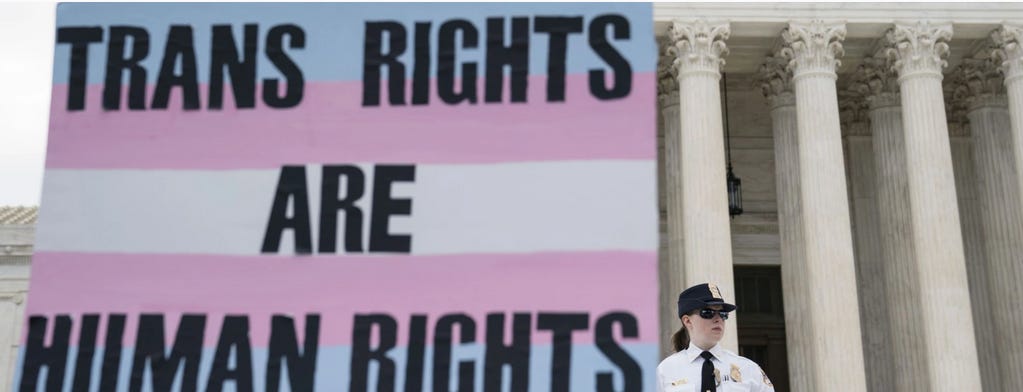Trans Propaganda From Bloomberg
It's complicated but ... the U.S. Supreme Court has not issued a blanket prohibition on discriminating against trans people in employment.
Note - My contention the Bloomberg article was wrong was vindicated / upheld in a federal judge’s 10/23/2025 decision holding that Title IX does not protect discrimination based on “gender identity.” Bloomberg was plainly wrong, and yet it ignored / refused my three requests for a correction. This is an indictment of trans bias in the media. See the decision to which I refer here.
Here’s how it works.
A legal publication publishes a story.
The story is cited by advocates in legal briefs to persuade the judge(s) about the correct interpretation of the law.
The U.S. Supreme Court is currently preparing to hear a case involving whether the U.S. Constitution allows men who identify as women to play on female sports teams.
Bloomberg Law apparently favors this. The publication published a story last week in which it stated that U.S. Supreme Court precedent in the employment context “said that under Title VII, discriminating against someone for being transgender is prohibited because it necessarily involves discriminating based on sex.”
Title VII of the Civil Rights Act of 1964 is the federal civil rights law that prohibits employment discrimination on the basis of sex, race, religion, color, national origin, and, in some cases, gender identity.
I asked Bloomberg for a correction because the article did not accurately describe the ruling cited by Bloomberg in the article, the U.S. Supreme Court’s 2020 decision, Bostock v. Clayton County. My request apparently was denied.
As I told Bloomberg editors, Bostock was sharply limited to whether an employer can fire employees who identify as the opposite sex because they are trans.
U.S. Supreme Court Justice Neil Gorsuch, who wrote the Bostock opinion, went to great pains to state the decision did not pertain to anything other than the facts of the case. Here’s what he wrote:
“The employers worry that our decision will sweep beyond Title VII to other federal or state laws that prohibit sex discrimination. And, under Title VII itself, they say sex-segregated bathrooms, locker rooms, and dress codes will prove unsustainable after our decision today. But none of these other laws are before us; we have not had the benefit of adversarial testing about the meaning of their terms, and we do not prejudge any such question today. Under Title VII, too, we do not purport to address bathrooms, locker rooms, or anything else of the kind. The only question before us is whether an employer who fires someone simply for being homosexual or transgender has discharged or otherwise discriminated against that individual ‘because of such individual’s sex.’”(Emphasis supplied)
So, contrary to Bloomberg, Bostock does not say that “discriminating against someone for being transgender is prohibited because it necessarily involves discriminating based on sex.”
The Court could very well decide in future cases that it is not prohibited for employers to ban male employees who identify as women from women’s bathrooms, or women’s locker rooms, and that employers have a right to institute dress codes.
Moreover, the Bloomberg story was headlined: “Trump’s Trans Athlete Stance Clashes With States’ Rights Claim.” The article discusses Title IX, a federal law passed in 1972 that prohibits sex-based discrimination in any educational program or activity receiving federal financial assistance. The Bostock decision has no direct relationship whatsoever to Title IX.
Based on an executive order by President Donald J. Trump, the U.S. Department of Education last year issued updated Title IX regulations that treat sex as binary (male and female) and do not extend protection based on gender identity. Thus, students who were born male cannot play on the sports teams of students who were born female.
In the body of the story, Bloomberg says 27 states ban boys who identify as girls from playing female sports. Other research shows that 18 states and the District of Columbia -almost all led by Democrats- disagree, claiming the updated Title IX regulations violate their state sovereignty.
The U.S. Supreme Court is considering several cases related to transgender rights and the U.S. Constitution’s Equal Protection clause.
Bloomberg’s article will likely be cited to the Court by advocates for transgender rights to support their claim that discriminating against transgender people is prohibited under the principles enunciated in Bostock.
Needless to say, Bloomberg exhaustively represented the position of trans advocates in the article, while virtually ignoring the position of women and girls who don’t want men and boys on their sports team or to compete against men and boys.
Additionally, the science conclusively shows that males have a biological advantage that makes their participation in women’s athletics both unfair and risky for women and girls.
Moreover, Bloomberg states that the “Fourth and Seventh circuits have held that transgender-based discrimination violates Title IX.”
Bloomberg fails to note that the Seventh Circuit appears to have reconsidered its stance in November 2024, when it issued a split decision allowing Indiana’s ban on gender-affirming care for minors to take effect pending further litigation.
The Seventh Circuit in K.C. v. Individual Members of the Medical Licensing Board of Indiana (2024) upheld a state law that prohibits Indiana-licensed physicians and practitioners from providing gender transition procedures - such as puberty blockers - to minors for treating gender dysphoria. The appeals court ruled 2 to 1 that the law does NOT violate the Equal Protection Clause, infringe on substantive due process rights, or violate the First Amendment.
Bottom line: Bloomberg’s story is highly biased, as are most stories written by mainstream publications on trans rights. Why? Someone should ask them.

